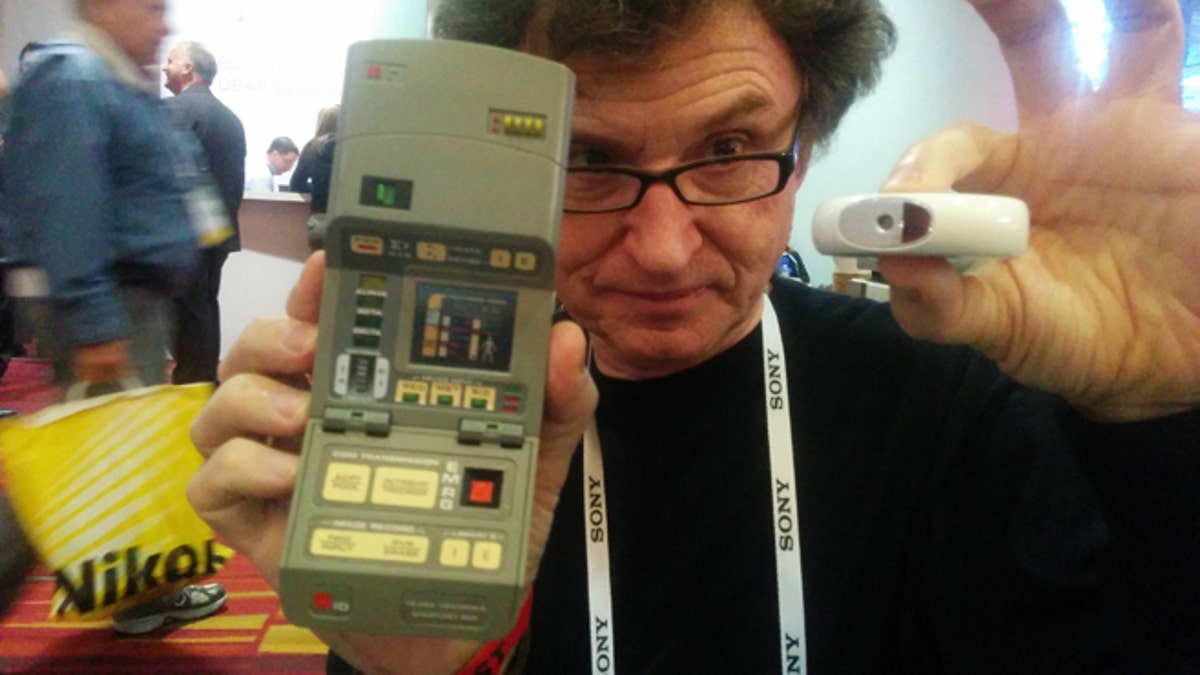
In Walter De Brouwer's right hand, the tricorder used on the TV series "Star Trek." In his left hand, a real-world version he has invented. (Jeremy Kaplan/FoxNews.com)
"Bones" would have approved.
On a mission to boldly go where no man has gone before, the crew of the USS Enterprise faced unknown dangers on strange new worlds. Fortunately, they were armed were phasers to defend themselves -- and a device called a tricorder, to quickly diagnose whatever ailed them.
'I’d always been interested in the combination of two sexy things: space and medicine.'
Unfortunately, modern medical care lacks such a gizmo.
Scanadu aims to change that.
Using the same operating system that powers the Mars rover, the Scanadu Scout is a real-world version of the TV show's tricorder, a hand-held gadget about the size and shape of an Oreo cookie that can help a doctor diagnose anything from abdominal cramps to zoster (otherwise known as shingles) by scanning various vital signs, including temperature, respiratory rate, heart rate, and blood pressure and sending those readings to a smartphone.
"I’d always been interested in the combination of two sexy things: space and medicine," founder and CEO Walter De Brouwer told FoxNews.com. And recognizing that modern science could actually do much of the diagnostic work that the Star Trek gizmo he was so infatuated with could, De Brouwer set out to build one.
Called the Scout, the device has existed only in labs and the mind of founder and CEO Walter De Brouwer. At the 2014 Consumer Electronics Show (CES), he showed off a prototype for the first time ever. The design of the device -- a toroid, a notoriously challenging shape to manufacter -- is nothing like the clunky gray plastic box Bones used on the TV show. That product of the 60s was designed “before SJ, before Steve Jobs” he told FoxNews.com.
Just as writers couldn't have imagined today's iPhones, they didn’t envision the shiny, sleek disc that he’s working on.
It holds a variety of sensors to gauge vital signs; a near invisible hole atop the gadget has a microphone. After holding the gadget to the temple for 10 seconds, all of those health statistics are measured and transmitted to the user's smartphone, not necessarily to diagnose disease (although it could) but to help inform the holder about himself.
"Why shouldn't we own our own medical devices? Why shouldn't we give each other advice on our health?" he asked? The current American medicine cabinet holds a thermometer and likely not much more. De Brouwer envisions people carrying the very portable gadget around with them and becoming far more familiar with their day-to-day health.
"This is going to produce a new conversation with doctors," he said.
De Brouwer, a 56-year-old native of Belgium, currently lives in California. He still needs FDA approval before his device can hit market, something the company is working with the agency
toward. In March, the company plans to produce a raft of working prototypes for a field test of 10,000 people, part of the company's path to FDA approval. It will be assembled in Fremont, Calif.
“We are cutting steel, as they say.”
He plans to submit the full paperwork for FDA approval in the fall -- then it's in the hands of the FDA.
"Sapere aude," the device reads -- "know thyself." It's an apt slogan.
